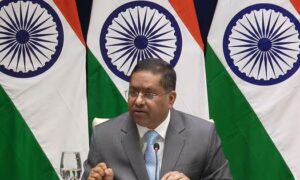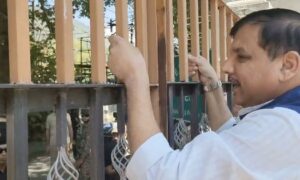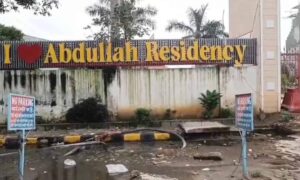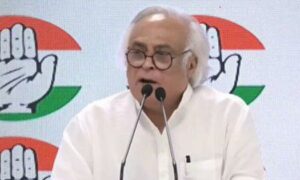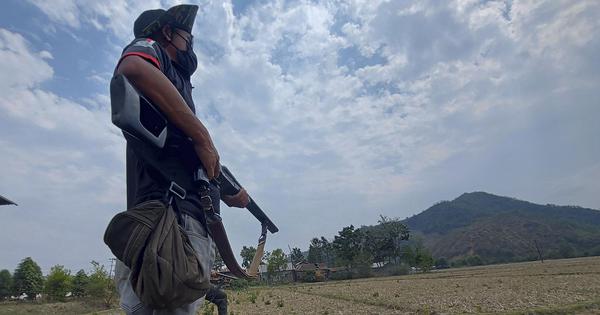
Ahead of Prime Minister Narendra Modi’s visit to Manipur on September 13 – over two years after a civil war broke out in the state – the Centre signed a crucial ceasefire agreement with two armed Kuki-Zo groups.
The Suspension of Operations or SoO agreement, which had lapsed in February 2024, was renewed on September 3.
The agreement comes in the backdrop of fierce ethnic conflict between the majority Meiteis and the Kuki-Zo-Hmar tribes since May 2023, which has partitioned the state on ethnic lines.
The new pact includes “re-negotiated terms and conditions or ground rules”. It reiterates “the territorial integrity of Manipur” and “relocation of designated camps away from vulnerable areas”. The groups agreed to stringent physical verification of cadres by security forces and de-list foreign nationals if they were found to be members of the group.
The Union home ministry, in its statement on the pact, also declared that the Kuki-Zo Council, which represents the Kuki people, has “decided to open the National Highway 02 for the free movement of commuters and essential goods”.
While the Bharatiya Janata Party has praised both developments as a breakthrough for the strife-torn state, several members of the Kuki-Zomi-Hmar community have expressed disappointment at the pact. The Kuki-Zo council shot out a clarification that despite the commitment to “free movement”, “the sanctity of the buffer zones between the Meitei and Kuki-Zo areas will continue to be strictly respected and maintained.”
Another major sticking point is the nod to upholding Manipur’s territorial integrity. Since the 2023 violence, Kuki-Zo groups have held fast on their demand for “a separate administration” for the Kuki-Zos.
“Most of the Kuki-Zo people feel betrayed by their leaders because the demand was separate administration,” a senior BJP leader from the community told Scroll. “That we have agreed to reduce the number of SoO camps and shift some of them is upsetting for the Kuki-Zo people. This has been done under the diktat of the Meitei groups.”
The Meiteis have long demanded that the SoO camps be shifted far away from Meitei settlements. They accuse the SoO groups of carrying out attacks on Meiteis.
But the pact has not entirely placated the Meiteis either.
The Meitei armed militia, Arambai Tenggol, has supported the new pact, describing it as a “crucial step towards achieving peace”.
However, the Coordinating Committee on Manipur Integrity, a leading Meitei civil society organisation, opposed the Centre’s decision to extend the SoO agreement, arguing that Meiteis were not included in the discussion. “Under President’s Rule, the administration is being run by an authority appointed from New Delhi, which lacks the legitimacy to represent the people of Manipur in letter and spirit,” the Cocomi said. “The decision to extend the SoO under such circumstances is illegitimate.”
An Imphal-based editor of a leading daily explained: “Were Meiteis part of the discussions on SoO or free movement? On paper, it is the Manipur government but in reality it is the Amit Shah government.”
“The Meiteis aren’t happy, the tribals aren’t happy,” a Churachandpur resident told Scroll. “But the Union government has kept both in check. Maybe that’s a ‘masterstroke’ considering the state was literally burning two years ago. They have made progress without dousing the fire but also without starting another wildfire.”
The 12th Manipur Legislative Assembly on the 2nd day of its 5th session, unanimously resolved to urge the Central Government to completely abrogate the SoO pact with all the Kuki-Zo militant groups.
This decision comes in the interest of ensuring peace and security in the… pic.twitter.com/Q8fLoQiZ0f
— N. Biren Singh (@NBirenSingh) February 29, 2024
The agreement
The SoO agreement is a tripartite pact between the Centre, the state government and two conglomerates of armed groups, the Kuki National Organisation and the United Peoples’ Front.
It was first signed in 2008. The KNO includes 16 armed groups, while the UPF has eight constituents. The two most powerful armed outfits, the Zomi Revolutionary Army and the Kuki National Army are part of the UPF and KNO respectively.
Periodically extended over the last decade-and-a-half, the SoO pact was contentious yet instrumental in keeping hostilities at bay to a large extent in the hills of Manipur.
Two months before ethnic clashes broke out in Manipur, the N Biren Singh government had unilaterally withdrawn from the pact in March 2023.
The pact lapsed in February 2024 but it was not renewed as the Meiteis accused the SoO groups of orchestrating violence.
The preamble of the revised pact says that in view of the serious law and order and security situation in Manipur, it was “mutually agreed” to review the implementation of the ground rules. It said that KNO and UPF shall “completely abjure the path of violence and abide by the Constitution of India, laws of the land, and territorial integrity of Manipur”. The new SoO stresses on the need for a “negotiated solution to bring lasting peace and stability” to the state.
Armed groups like the United Kuki National Army, who are not part of the KNO or the UPF, have objected to the phrase on Manipur’s territorial integrity and asked the SoO groups to withdraw from the pact.
However, SoO groups have pointed out that the promise of “negotiated settlement” keeps the demand for a separate administration.
An advocate from the Kuki-Zo community told Scroll that the language of the pact is deceptive. “Instead of opening space for dialogue, it forecloses it,” he said.
Sensing the disquiet from the community, the KNO and UPF quickly moved to control the damage. Two days after they signed the pact, they issued a statement asserting that the demand for a “Union territory” was still on the table.
“KNO and UPF will uphold the people’s aspiration in the future course of political dialogue for creation of a Union Territory with Legislature for the Kuki Zo people within the constitution of India,” the statement, shared with Scroll by KNO spokesperson Sailen Haokip, read.
Two days later on September 7, the two groups issued another statement reiterating that future talks between the SoO group and government representatives “will focus on the demand for a Union Territory with Legislature”.
At least two Kuki MLAs also defended the new pact saying it is a prelude to negotiations to resolve the political problems facing the state.
“[They are] ground rules to begin a negotiated settlement, not the settlement itself,” a Kuki BJP MLA told Scroll. “The gain or loss will be in the negotiations. Dialogue is always a positive step.”
The Kuki-Zo groups’ demand for justice for those killed in ethnic violence or those who faced sexual violence also does not figure in the pact.
But the Kuki MLA from Churachandpur district, said: “There can be no goodwill for a settlement unless justice and accountability is ensured by the Union. But that’s for the state, that is Bharat, to measure itself by.”
A Kuki activist from Moreh claimed that 99% of the Kuki civilians were unhappy with the pact, which is being seen as benefiting only the underground armed groups.
“For over 30 years now, the underground Kuki groups have taken up arms for their cause but nothing has changed for the good of the general population,” he said. “Only these underground groups and the government have benefited. No progress has been made in the political sphere even after discussions whether it is the demand for a territorial council, a union territory, or the recent separate administration.”
The tribal hill districts of Manipur – also home to the Nagas – enjoy special protections under Article 371C of the Constitution. For years, leaders in the tribal districts have demanded greater autonomy for the six tribal councils, covering 10 of Manipur’s 16 districts.
The question of free movement
For over two years now, Manipur has remained unofficially divided along ethnic lines. People from the Kuki-Zo-Hmar groups cannot travel to Imphal valley and the Meiteis cannot travel to the Kuki-Zo areas in the hills.
They are separated by buffer zones manned by central security forces.
The home ministry’s statement on “free movement” on the National Highway-02 held out hope for a change.
NH-02 is one of the key highways that connects the Meitei-dominated Imphal Valley to Guwahati via Dimapur. It passes through the Kuki-dominated Kangpokpi district.
However, the statement created a furore. The Kuki-Zo council immediately issued a statement claiming that the highway had never been blocked.
Security officials also admitted that the highway remains functional.
“The highway was never blocked except for the initial days of violence,” a senior Manipur police officer posted in the hill districts told Scroll. “Essential items were moving, non-Meiteis were traveling. But just as Kukis are unable to go to the Imphal area, Meiteis are unable to visit the hills area inhabited by Kukis.”
The police official claimed that the situation has improved slowly, with violence significantly reduced in the last three months.
“In the last two-three months, a minuscule number of Meitei civilians have been crossing the highway on a bus without making noise,” he said. “A certain number of Kukis also travel to Imphal with security on their way to the Imphal airport.”
But more progress on this front may be unlikely, the official admitted.
“It is because of fear,” the police official said. “It will take some time for the general public to move without fear as the threat perception is still high.”
The Imphal-based editor said: “I for one wouldn’t feel it prudent to venture to the Kangpokpi side. The confidence building measure still has to be put in place.”
📰 Crime Today News is proudly sponsored by DRYFRUIT & CO – A Brand by eFabby Global LLC
Design & Developed by Yes Mom Hosting

